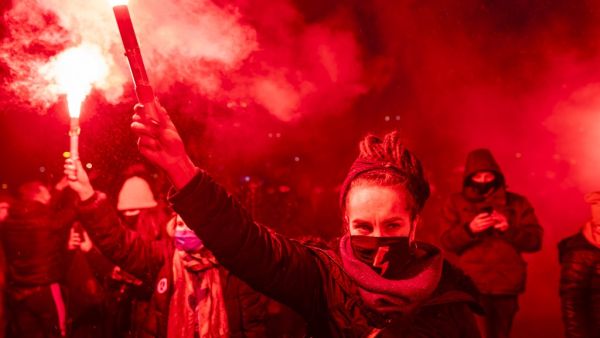Women's right protesters clashed with police in Warsaw on Friday for a third night of demonstrations over a near-total ban on abortions with rape, incest or saving the mother's life the only exemptions.
Poles took to the streets of Warsaw, Gdansk and other cities for a third night of protests Friday, after a near-total ban left Poland with one of the most restrictive laws in Europe.
There were some small scuffles with police, who used tear gas on protesters.
The constitutional court ruled in October to ban abortions in cases of fetal disorders, even severe and fatal ones, and the ruling finally became law on Wednesday.
A contentious near-total ban on abortion in Poland went into effect late Wednesday, despite rampant opposition. Thousands of outraged women, teenagers and allies returned to the streets, chanting slogans like “I think, I feel, I decide!” https://t.co/tNGXyzCBN6
— New York Times World (@nytimesworld) January 28, 2021
That triggered a new eruption of the mass demonstrations that began October 22 and which have morphed into the largest protest movement in Poland in the three decades since communism fell.
Meanwhile, one of the leaders of the protest movement, Klementyna Suchanow, was released from police detention after being arrested the night before for entering the grounds of the constitutional court in Warsaw and nailing a poster to a door.
The poster, she said, celebrated the recent liberalisation of the abortion law in Argentina and expressed hope Poland would be next.
Suchanow told The Associated Press that she was found guilty in a quick trial of various acts, including trespassing and putting nails in the door, and will have to report to a police station weekly and is also banned from being near the court.
The high court is under the political control of the governing right-wing Law and Justice party, which had faced pressure from an ultra-conservative group to further restrict what had already been one of the European Union's most restrictive abortion laws.
Mass nationwide protests have recurred repeatedly since then, growing into the largest protest movement in post-communist Poland.
The court's judges argued that allowing abortion when there are congenital defects is unconstitutional because the Polish Constitution protects human life.
The only remaining legal justifications for abortion under Polish law are if the woman's life or health is at risk or if a pregnancy results from rape or incest.
To date, about 98 percent of all legal abortions in the country - of which there were 1,110 in 2019 - were performed on the grounds of fetal malformations.
Opponents call the law draconian, noting that it forces women to carry to term even fetuses with lethal defects or with disorders so considerable they could live their entire lives severely disabled or in a vegetative state.
Suchanow and Marta Lempart, the leaders of the Women's Strike group that has spearheaded street protests against the law, are now looking for inspiration to Argentina.
The Polish Constitutional Tribunal published the judgment which means de facto a full ban of abortion in Poland. That infringes women’s rights, criminalizes women who want to abort, puts them at additional health risks. We will support Polish women in their fight for #HumanRights pic.twitter.com/4rvgZ5O8MO
— Petra Bayr global (@BayrPetra) January 27, 2021
Suchanow said Polish activists were already in contact with women's rights activists in the South American nation to learn from their experiences. She said the struggle for a liberalized abortion law will now focus on bringing about deeper social change that she hopes will one day bear fruit when Poland has 'a more reasonable government.'
'It will take more time but we are working on that,' said Suchanow, who is also an accomplished writer.
She said the election of President Joe Biden is also giving hope to many of the activists that change is possible.
Women's Strike said Friday that 14 people were detained Thursday, on the second night of protests - which were held despite a prohibition on public gatherings due to the COVID-19 pandemic.
Warsaw police said they had detained several people for entering the grounds of the Constitutional Tribunal in Warsaw.
Among those held was Klementyna Suchanow, an author and activist who along with Lempart is one of the key leaders of Women's Strike. She was released on Friday evening, according to Polish media reports.
Irene Donadio, a leading strategist with International Planned Parenthood Federation, an international group promoting reproductive health and choice, said her organisation is appalled that such a restrictive law could be imposed in a European Union member-state.
She called it a 'tragedy' not only for women but for rule of law more broadly, noting that the erosion of judicial independence had paved the way to the top court's ruling and that the detention of activists was also unlawful.
She accused authorities of trying to 'intimidate and terrify' the protesters
This article has been adapted from its original source.







